| ⇦ | 
| ⇨ |
The leaves of Mimosa pudica droop down, when touched, due to
Options
(a) nyctinasty
(b) seismonasty
(c) photonasty
(d) epinasty
Correct Answer:
seismonasty
Explanation:
Nastic movements occur in response to a stinulus. It is independent of its direction. They are shown by bifacial organs (leaves, sepals, petals) and are in response to diffused external stimulus. Seismonastic movements are due to shock or touch stimulus. Such movements are shown by Mimosa pudica. The leaf of Mimosa is compound having four pinna and each pinna is having many pinnules. If a terminal pinnule is touched, the whole leaf droops down. This is due to fact that at the bases of pinnules, pinna and wh
Related Questions: - Chromatophores take part in:
- Haversian system is a diagnostic feature of
- What is not true about glial cells
- Which group is responsible for formation and flavour of yoghurt
- The lower most layer of atmosphere in which man and other living organisms exist
Topics: Plant Growth and Development
(126)
Subject: Biology
(4253)
Important MCQs Based on Medical Entrance Examinations To Improve Your NEET Score
- Chromatophores take part in:
- Haversian system is a diagnostic feature of
- What is not true about glial cells
- Which group is responsible for formation and flavour of yoghurt
- The lower most layer of atmosphere in which man and other living organisms exist
Topics: Plant Growth and Development (126)
Subject: Biology (4253)
Important MCQs Based on Medical Entrance Examinations To Improve Your NEET Score
18000+ students are using NEETLab to improve their score. What about you?
Solve Previous Year MCQs, Mock Tests, Topicwise Practice Tests, Identify Weak Topics, Formula Flash cards and much more is available in NEETLab Android App to improve your NEET score.
Share this page with your friends

Leave a Reply